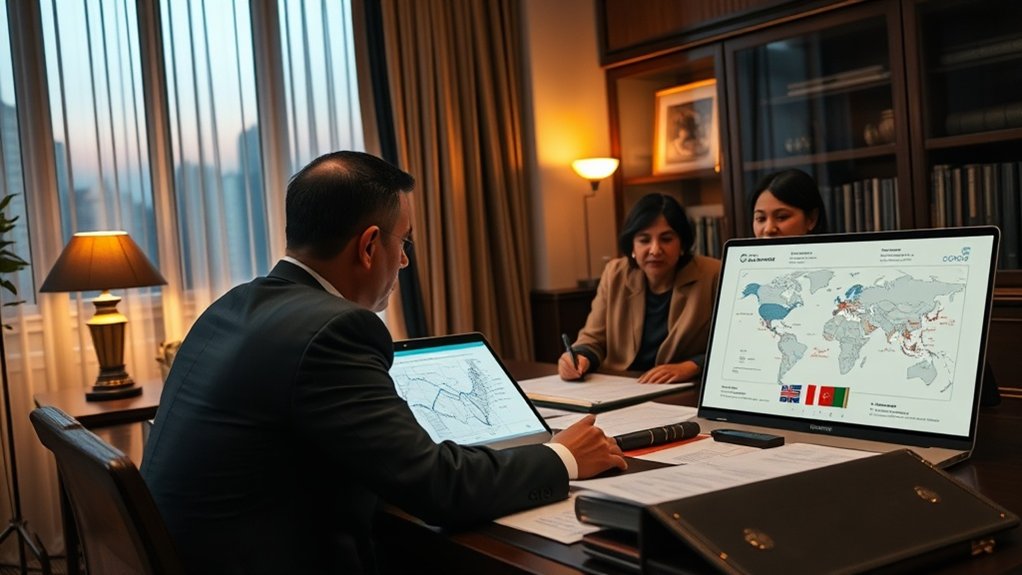If you’re considering a more stable future after moving from Afghanistan, understanding the steps from temporary to permanent residence could be crucial. You’ll need to recognize the right residency options and prepare key documents to stay on track. With complex requirements and tight timelines, every detail matters. There are proven strategies and common pitfalls you should know about—so before you take your next step, let’s make sure you’re equipped for what’s ahead.
Understanding Temporary Residency Options for Afghans

While the process of leaving Afghanistan can feel overwhelming, it’s important to know which temporary residency options are available to you. Understanding these choices helps you make informed decisions for yourself and your family. You can explore humanitarian visas, student permits, or temporary protection programs, depending on where you hope to settle. Each country has different programs, timelines, and requirements, so it’s crucial to research and choose the one that matches your needs the best.
If you’re considering countries like Brazil, Canada, or the United States, you’ll find options such as humanitarian parole, refugee status, or sponsorship initiatives. These paths don’t grant you permanent residence immediately, but they do offer legal stay and safety as you work towards more stable status. When you arrive, start gathering documents, learning about local laws, and building your case for the next steps. This thoughtful preparation lays the groundwork for future applications.
Seeking out professional support can help ensure you follow the correct procedures and avoid costly mistakes during your temporary residency process.
Eligibility Criteria for Permanent Residence
To qualify for permanent residence, you’ll need to gather specific documents, meet language requirements, and pass a security background check. Make sure your paperwork is complete and that you can show your proficiency in the required language. You’ll also undergo a thorough review to confirm you meet all the security standards. For the best chance of success, specialized legal assistance significantly increases your likelihood of approval and helps ensure that all your documentation meets up-to-date standards.
Required Documentation Checklist
As you start preparing your application for permanent residence, gathering the correct documents becomes crucial to proving your eligibility. You’ll need to organize official records that verify your identity, current status, and history. Ensure you collect original documents or certified copies, as incomplete paperwork can delay your application. Consider making a checklist to track what you have and what’s missing. Here’s a quick guide to get you started:
| Document Type | Purpose |
|---|---|
| Passport or ID card | Confirms your identity and nationality |
| Proof of Legal Entry | Verifies your lawful entry or current status |
| Residence Proof | Shows where you’re living in the host country |
Legal guidance from an immigration lawyer can help you navigate complex and evolving immigration laws while ensuring your documentation is complete and correctly prepared. Double check each document for accuracy and validity. Keep scanned copies for your records. Accurate documentation ensures smoother processing and fewer surprises along the way.
Language Proficiency Standards
Although the paperwork is essential, you’ll also need to meet specific language proficiency standards to qualify for permanent residence. Authorities require proof that you can communicate effectively in the country’s official language—usually through standardized testing such as IELTS, CELPIP, or a comparable exam. You’ll need to achieve at least the minimum score set for your chosen immigration pathway.
Make sure you schedule your test early, as processing times can vary, and you don’t want delays. Keep your original test results, since some applications require physical proof. If you’re not confident in your language skills, consider enrolling in preparatory courses before taking the exam. Remember, meeting these standards proves your ability to integrate into society and increases your application’s chances of success. For certain pathways, such as employment-based Green Card categories, demonstrating language proficiency and other eligibility criteria is essential to prevent application delays and maximize your success.
Background Security Assessment
Before you can move forward toward permanent residence, you’ll need to pass a background security assessment. Authorities conduct these checks to confirm you don’t pose a security risk or have any involvement in criminal activity. They’ll review your personal history, including travel records, previous addresses, and interactions with law enforcement, both in your home country and abroad. Be ready to provide accurate, honest information—false or incomplete disclosures can delay or even jeopardize your application.
Additionally, expect your biometric data, like fingerprints and photographs, to be collected and scanned against security databases. This process aims to guarantee community safety. If any concerns emerge, you’ll have to respond to follow-up questions or provide more documentation. Passing this assessment is essential for progressing to permanent residence. Seeking assistance from immigration professionals can help you avoid application denials and ensure your documentation meets all requirements.
Essential Documentation and Application Process
When you’re preparing to transition from temporary to permanent residence as an Afghan applicant, assembling the correct documentation is crucial to ensure your application proceeds smoothly. Start by gathering personal identification, such as your current passport, residence permit, and any travel documents. You’ll need proof of your Afghan nationality, like a national ID card or birth certificate. Compile documents validating your legal status in the host country, including your temporary visa and any relevant entry permits.
Next, collect records demonstrating your integration and stability—proof of employment, housing contracts, and evidence of financial stability, such as recent payslips or bank statements. Don’t forget official forms required by immigration authorities; fill them out accurately and attach supporting documents. Obtain clear, certified translations of any documents not in the official language of your destination country. Ensure each document is current, complete, and legible before submission to avoid unnecessary delays in the application process. For further support during this complex transition, seeking reliable legal assistance can greatly increase your chances of success and ensure compliance with ever-changing immigration regulations.
Common Challenges and How to Overcome Them

Navigating the transition from temporary to permanent residence often means facing several hurdles that can delay or complicate your application. You might experience issues like language barriers, incomplete paperwork, long processing times, or confusion over changing immigration policies. It’s crucial to stay organized and proactive, making sure all your documents are up-to-date and submitted promptly. You should also keep track of any policy updates that could impact your eligibility or the documentation needed. Remember that professional guidance from a specialized attorney can significantly improve your chances of approval when moving from temporary to permanent residency.
Here’s a quick overview of frequent obstacles and some practical solutions:
| Challenge | Solution |
|---|---|
| Language Differences | Use translation, community support |
| Missing Documentation | Prepare a document checklist |
| Application Delays | Track deadlines, follow up regularly |
| Policy Confusion | Read official updates, ask questions |
Role of Legal Assistance in the Transition
You’ll find that legal assistance really helps you sort through complex documentation and avoid mistakes that could slow your progress. When you have an advocate during the application process, you’re not facing it alone—they represent your interests and help you respond to any concerns. With professional support, you can navigate each step more confidently and increase your chances of success. Additionally, understanding the risks of delays, visa denials, and deportations highlights why having a knowledgeable immigration lawyer is essential for a successful transition.
One critical step in moving from temporary to permanent residence involves gathering and submitting the right legal documentation. If you miss a document or submit inaccurate details, your path to permanent residency could be delayed or denied. Legal professionals help you identify exactly which forms, certificates, and identification papers you’ll need. They’ll also guide you through translations, notarizations, and deadlines, making sure nothing falls through the cracks. Instead of feeling overwhelmed by the bureaucracy, you can approach this phase confidently. To stay organized and efficient, always:
- Double-check document requirements before compiling your file
- Keep original copies and certified translations in a secure place
- Track all submission dates to avoid missing critical deadlines
Seeking legal guidance to avoid severe repercussions is especially important for Afghans navigating Brazil’s complex immigration requirements, as even small errors can result in significant setbacks.
Advocacy During Application Process
After preparing your legal documents, the next challenge involves advocating for yourself throughout the application process. You’ll need to respond quickly to requests from immigration authorities, provide supplemental information, and clarify details if questions arise. This is where legal assistance becomes essential. An experienced lawyer can anticipate concerns, draft concise responses, and ensure that every communication strengthens your case.
Legal professionals don’t just explain procedures—they represent you, protect your rights, and follow up on your application’s status. If problems or delays occur, your advocate addresses them proactively and knows how to escalate issues effectively. With guidance from a trusted advisor, you’re far less likely to overlook important steps or deadlines, significantly improving your chances of a successful transition to permanent residence. In addition, a qualified attorney ensures regulatory compliance throughout your journey, helping to avoid costly mistakes and reducing the risk of setbacks in your application.
Key Timelines and Processing Insights

While navigating the pathway from temporary to permanent residence, understanding the key timelines and processing steps becomes crucial for Afghans seeking stability in Canada. Knowing when to submit documents, what to expect during processing, and how long each stage takes allows you to plan better and manage expectations. Typically, the temporary residence stage, such as a work or study permit, lasts a few months to a couple of years. Transitioning to permanent residence often involves additional paperwork and scrutiny, with standard processing times ranging from six months to over a year, depending on your program and case complexity.
To stay on track throughout this journey, focus on:
- Monitoring official IRCC updates to keep pace with any changes in processing times.
- Preparing all required documents early to avoid unnecessary delays or requests for additional information.
- Understanding your eligibility window so you don’t miss key deadlines for submitting your permanent residence application.
Success Stories and Practical Recommendations
Even in the face of uncertainty, many Afghans have successfully transitioned from temporary to permanent residence in Canada by staying proactive and well-informed. You can follow their example by documenting every step, keeping all correspondence with immigration authorities, and seeking timely advice from immigration professionals like Vieira Braga Advogados. Many applicants shared that regularly checking for program updates and swiftly responding to government requests sped up their process.
Start preparing your documents early, especially proof of employment, language test results, and reference letters. Don’t hesitate to reach out to community support services; these organizations often provide guidance and crucial information. Stay organized—create a simple checklist, set reminders for deadlines, and track application progress. If your case hits an obstacle, consult professionals who know the intricacies of Afghan applications. By learning from others’ journeys, you put yourself in the best position to transition smoothly toward permanent residence in Canada.
Frequently Asked Questions
How Can Afghans Access Language Support During the Application Process?
You can access language support by contacting local immigrant service organizations, which often provide free interpretation or translation services during your application process. Many government websites offer application forms and guides in multiple languages. Don’t hesitate to ask for an interpreter when appearing at interviews or appointments. If you’re working with a lawyer or advisor, request that they arrange language assistance to ensure you fully understand every step and requirement.
Are There Financial Grants Available for Afghan Applicants?
Yes, you can access financial grants as an Afghan applicant in some situations. You’ll need to check with local immigration agencies, non-profit organizations, and government programs, since eligibility and funding can vary a lot depending on where you apply. Don’t hesitate to reach out for guidance—many organizations offer support specifically for newcomers like you, which can cover application fees or living expenses while you work on your residence application.
Can Afghans Work While Their Permanent Residency Is Being Processed?
Yes, you can work while your permanent residency application is being processed, as long as you hold a valid temporary residence permit. This permit usually gives you the right to work legally in the host country, so you don’t have to wait for your permanent status to start employment. Just make sure your work authorization stays current and complies with any specific conditions linked to your temporary status until your process finishes.
What Happens if an Application Is Denied?
If your application is denied, you’ll receive a letter explaining the reasons for the decision. You can review the reasons and, if you believe there’s a mistake, you have the right to appeal or request reconsideration, depending on the country’s procedures. It’s important to act quickly, gather any missing or additional documents, and seek legal advice if needed. Don’t ignore the denial—timely action improves your chances for a positive outcome.
How Can Families Be Reunited During the Residency Process?
You can request family reunification by including close family members in your residency application or by submitting a separate reunification request once you’ve secured your status. Make sure you’re providing all required documents proving your relationship—like marriage certificates or birth certificates—and follow any deadlines or country-specific requirements. Don’t forget to check for updates or changes in policies, as procedures might change, and staying informed will help you avoid delays.
Conclusion
By following this roadmap, you’ll find clarity on your journey from temporary to permanent residence. Understanding your options, keeping documents organized, and honing language skills will make a real difference. Don’t hesitate to seek legal support—experts can help you overcome obstacles and meet key deadlines. Stay proactive, trust the process, and remember that persistence pays off. Many Afghans have already succeeded—your future in your new country is absolutely within reach if you take these steps.

